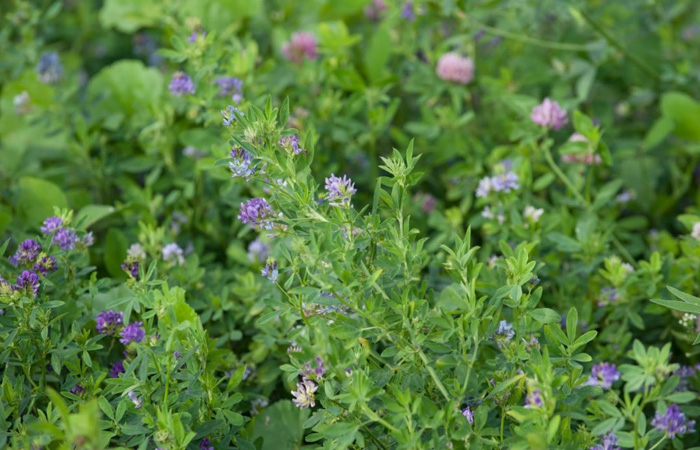Forages are food for animals either by being grazed or by harvesting the whole plant, stems, leaves and all. Alfalfa is considered the queen of forages. Dairy farmers love alfalfa partly because it is a perennial; that is, it does not have to be planted every year but can be harvested two or three times a year for five to eight years. It not only provides its own fertilizer through a symbiotic relationship with a bacteria, but it produces excess fertilizer which can be used by following crops for up to three years. Not only that, it also suppresses weeds so that a following crop, for example, wheat will have so few weeds that a herbicide may not be required. A three year stand of alfalfa can reduce wild oats by a significant amount.
The bottom line is that alfalfa is a great crop to have in rotation with other crops, however most crop farmers do not plant alfalfa because they do not have the livestock to feed it to and they typically do not have the correct equipment to harvest alfalfa.
I was on a committee through the University of Manitoba in 2004-2005 where we tried to expand the market of alfalfa by turning it into a human food. If we could do this, then alfalfa would be grown on all or most farms and provide its benefits to a wide range of farmers. It turns out that the protein in alfalfa, and there is a lot of it, sometimes up to 18-20%, is very similar to casein. You ask, “What is casein?” It is the main protein in milk. Casein is an excellent nutritional food because it has all amino acids essential for human health. Only a few foods such as milk, eggs and meat have all the essential amino acids. Plants typically have one or more of the essential amino acids missing. This makes alfalfa an excellent food for human consumption.
One of the ideas tossed around in our committee was to squeeze the juice out of alfalfa then make a high protein nutritious drink from it, adding some extra ingredients to make it more palatable. The idea didn’t make it out of the committee. Maybe it is time to revive it. There is much interest in healthy beverages these days.
Adding alfalfa to a farm can add diversity. Diversity on a farm has many benefits: reducing purchased fertilizer, reducing weed problems, reducing disease problems, and increasing stability and resilience. Crop rotation is the best way to add and maintain diversity on a farm. Most of our crop farms have low diversity in terms of life cycles of plants that they grow. Most crop farms grow only summer annual plants like wheat, canola, soybeans and corn. These are plants that start in the spring and die in the fall. They have to be planted each year. Alfalfa is a perennial that is planted once and can be harvested numerous times per year over many years.
If farmers had a bigger, stable market for alfalfa, perhaps as a human food like the other crops that we grow, they would probably love to grow alfalfa, improving the diversity, stability and profitability of their farms.




